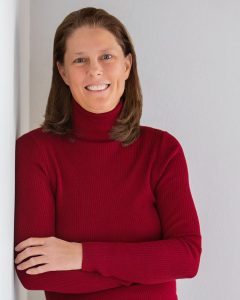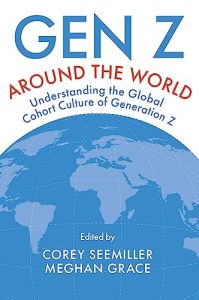
Corey Seemiller, professor of leadership studies in education and organizations at Wright State, examines Generation Z from a global perspective in her new book, “Gen Z Around the World.”
Generation Z — those born from 1995 through 2010 — is on the horizon of taking its place in American society, following Millennials, Gen Xers and Baby Boomers. What are they like?
Corey Seemiller, Ph.D., professor of leadership studies in education and organizations at Wright State University, and her co-collaborator have some answers, thanks to their most recent global Gen Z project.
Seemiller and Meghan Grace, Ed.D., released their new book, “Gen Z Around the World: Understanding the Global Cohort Culture of Generation Z.”
This is the third in a series, following “Generation Z Goes to College” and “Generation Z: A Century in the Making.” In between were papers, talks, podcasts and a TED Talk based on their research of this subset of young people.
This latest book builds on their 2014 original study. “It’s a snapshot of Gen Z — their styles, preferences, world views, relationships, how they learn,” Seemiller said.
She said they initially wanted to study Gen Z in the U.S. post-pandemic, she said, “then the world got involved.”
Seemiller and Grace received an inquiry from a researcher in Spain asking if they were doing a follow-up survey to the one in 2014, and if so, could Spain be included. Just days later, Seemiller and Grace received a similar request from a researcher in Australia.
“I have no idea how these people knew this was happening,” Seemiller said.
It was likely that Seemiller and Grace have a strong reputation in the Gen Z research community.
“People know us from our work. We’re some of the most-cited Gen Z researchers in the world, said Seemiller.
The requests to be part of the survey snowballed.
“We secured research teams from 31 countries. We sent all of them the same survey, and they translated it,” Seemiller said.
 Eventually, the survey was offered in 19 languages. In addition to the 31 partner countries, the survey reached members of Gen Z in 50 other nations for a total of 81. More than 21,000 people participated in the student, from countries such as Botswana, Singapore, Brazil, Germany and India.
Eventually, the survey was offered in 19 languages. In addition to the 31 partner countries, the survey reached members of Gen Z in 50 other nations for a total of 81. More than 21,000 people participated in the student, from countries such as Botswana, Singapore, Brazil, Germany and India.
“This is the largest and most comprehensive Gen Z study that we’re aware of,” Seemiller said.
The survey of about 40 questions was circulated from September 2021 through January 2022. The results were compiled in the 272-page book “Gen Z Around the World,” which was published on Jan. 15 and is available through Emerald Publishing and Amazon.
Seemiller said the expectation was that the findings would vary among countries and from pre- and post-pandemic. They were surprised.
“We found two interesting things,” she said. “One, they’re a pretty consistent generation despite COVID. They kept many of the same world views pre- and post-pandemic, such as being highly entrepreneurial and a DIY (do it yourself) generation. They prefer in-person communication but say they are not as skilled or confident face-to-face.
“Two, we thought Gen Z would be different around the world. But we got consistent responses from country to country,” she said. “There was some variance but not as much as expected.”
Seemiller believes Gen Z is more similar than different.
Members of Gen Z, which she said comprises over 20% of the world’s population, are huge advocates for the environment and addressing climate change. As this generation ages they are predicted to continue to make unified commitments toward environmentalism.
Seemiller has a continued interest in Gen Z because she works in higher education and wants to better understand who her students are. As a professor in organizational leadership, she focuses on employers and employees, and Gen Z is the new workforce.
“I like to do research that’s practical,” she said. “The research I do has an impact.”
She can talk to employers about how to recruit and retain young people and to educators about what to do in the classrooms.
“We’re more globally connected than people think. And Gen Z is more similar than they are different,” Seemiller said. “We want people to feel optimistic about this generation and excited about what they’re doing so they can leverage the potential and appreciate and support Gen Z as they come into adulthood.”

 Wright State joins selective U.S. Space Command Academic Engagement Enterprise
Wright State joins selective U.S. Space Command Academic Engagement Enterprise  Glowing grad
Glowing grad  Wright State’s Homecoming Week features block party-inspired events Feb. 4–7 on the Dayton Campus
Wright State’s Homecoming Week features block party-inspired events Feb. 4–7 on the Dayton Campus  Wright State music professor honored with Ohio’s top music education service award
Wright State music professor honored with Ohio’s top music education service award  Wright State’s Industrial and Human Factors Engineering program named one of top online graduate programs by U.S. News
Wright State’s Industrial and Human Factors Engineering program named one of top online graduate programs by U.S. News 